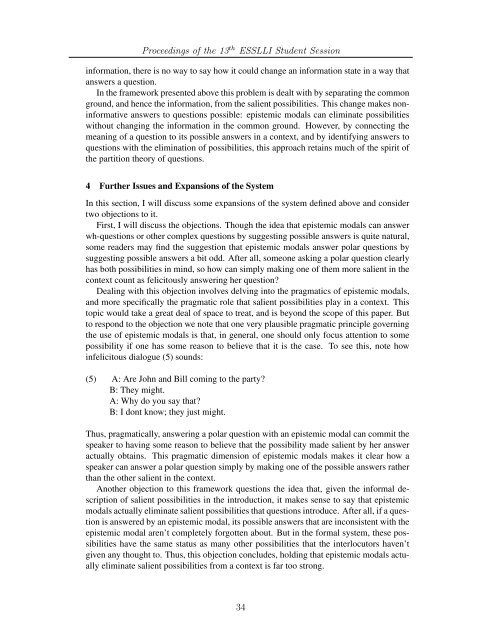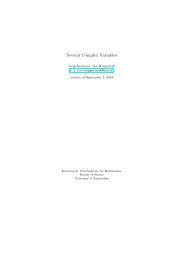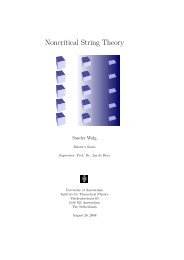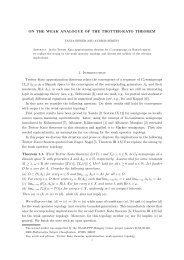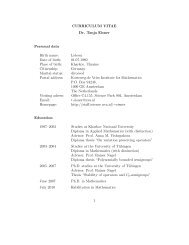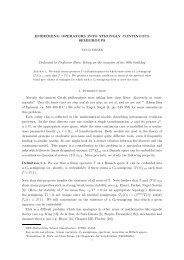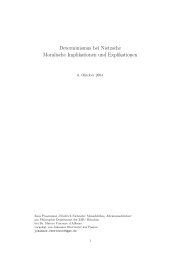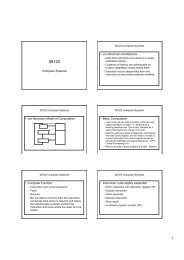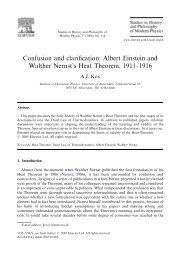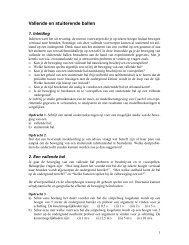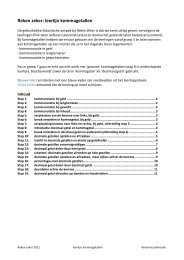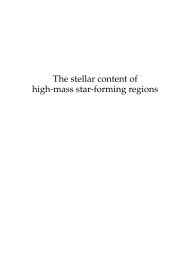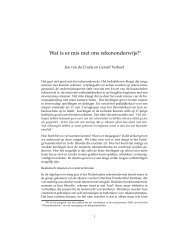Proceedings of the 13 ESSLLI Student Session - Multiple Choices ...
Proceedings of the 13 ESSLLI Student Session - Multiple Choices ...
Proceedings of the 13 ESSLLI Student Session - Multiple Choices ...
Create successful ePaper yourself
Turn your PDF publications into a flip-book with our unique Google optimized e-Paper software.
<strong>Proceedings</strong> <strong>of</strong> <strong>the</strong> <strong>13</strong> th <strong>ESSLLI</strong> <strong>Student</strong> <strong>Session</strong><br />
information, <strong>the</strong>re is no way to say how it could change an information state in a way that<br />
answers a question.<br />
In <strong>the</strong> framework presented above this problem is dealt with by separating <strong>the</strong> common<br />
ground, and hence <strong>the</strong> information, from <strong>the</strong> salient possibilities. This change makes noninformative<br />
answers to questions possible: epistemic modals can eliminate possibilities<br />
without changing <strong>the</strong> information in <strong>the</strong> common ground. However, by connecting <strong>the</strong><br />
meaning <strong>of</strong> a question to its possible answers in a context, and by identifying answers to<br />
questions with <strong>the</strong> elimination <strong>of</strong> possibilities, this approach retains much <strong>of</strong> <strong>the</strong> spirit <strong>of</strong><br />
<strong>the</strong> partition <strong>the</strong>ory <strong>of</strong> questions.<br />
4 Fur<strong>the</strong>r Issues and Expansions <strong>of</strong> <strong>the</strong> System<br />
In this section, I will discuss some expansions <strong>of</strong> <strong>the</strong> system defined above and consider<br />
two objections to it.<br />
First, I will discuss <strong>the</strong> objections. Though <strong>the</strong> idea that epistemic modals can answer<br />
wh-questions or o<strong>the</strong>r complex questions by suggesting possible answers is quite natural,<br />
some readers may find <strong>the</strong> suggestion that epistemic modals answer polar questions by<br />
suggesting possible answers a bit odd. After all, someone asking a polar question clearly<br />
has both possibilities in mind, so how can simply making one <strong>of</strong> <strong>the</strong>m more salient in <strong>the</strong><br />
context count as felicitously answering her question?<br />
Dealing with this objection involves delving into <strong>the</strong> pragmatics <strong>of</strong> epistemic modals,<br />
and more specifically <strong>the</strong> pragmatic role that salient possibilities play in a context. This<br />
topic would take a great deal <strong>of</strong> space to treat, and is beyond <strong>the</strong> scope <strong>of</strong> this paper. But<br />
to respond to <strong>the</strong> objection we note that one very plausible pragmatic principle governing<br />
<strong>the</strong> use <strong>of</strong> epistemic modals is that, in general, one should only focus attention to some<br />
possibility if one has some reason to believe that it is <strong>the</strong> case. To see this, note how<br />
infelicitous dialogue (5) sounds:<br />
(5) A: Are John and Bill coming to <strong>the</strong> party?<br />
B: They might.<br />
A: Why do you say that?<br />
B: I dont know; <strong>the</strong>y just might.<br />
Thus, pragmatically, answering a polar question with an epistemic modal can commit <strong>the</strong><br />
speaker to having some reason to believe that <strong>the</strong> possibility made salient by her answer<br />
actually obtains. This pragmatic dimension <strong>of</strong> epistemic modals makes it clear how a<br />
speaker can answer a polar question simply by making one <strong>of</strong> <strong>the</strong> possible answers ra<strong>the</strong>r<br />
than <strong>the</strong> o<strong>the</strong>r salient in <strong>the</strong> context.<br />
Ano<strong>the</strong>r objection to this framework questions <strong>the</strong> idea that, given <strong>the</strong> informal description<br />
<strong>of</strong> salient possibilities in <strong>the</strong> introduction, it makes sense to say that epistemic<br />
modals actually eliminate salient possibilities that questions introduce. After all, if a question<br />
is answered by an epistemic modal, its possible answers that are inconsistent with <strong>the</strong><br />
epistemic modal aren’t completely forgotten about. But in <strong>the</strong> formal system, <strong>the</strong>se possibilities<br />
have <strong>the</strong> same status as many o<strong>the</strong>r possibilities that <strong>the</strong> interlocutors haven’t<br />
given any thought to. Thus, this objection concludes, holding that epistemic modals actually<br />
eliminate salient possibilities from a context is far too strong.<br />
34


